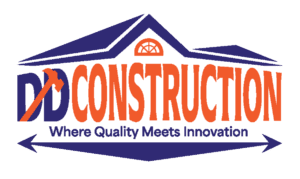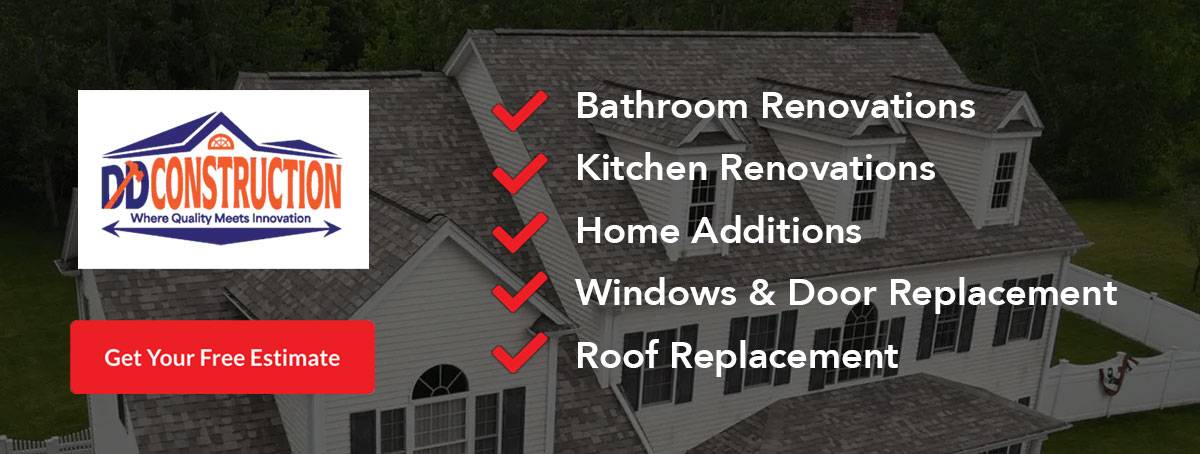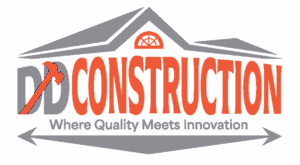How to Choose the Best Roof Contractor in Massachusetts: A Homeowner’s Guide to Finding Trusted and Affordable Roofing Services
Introduction In today’s competitive home improvement market, selecting a reliable roof contractor (ddconstructionma) in Massachusetts is essential for protecting your investment and ensuring lasting quality. Homeowners in Massachusetts face unique challenges such as harsh winter conditions, fluctuating temperatures, and intense summer storms, all of which put significant strain on roofing materials. As a result, choosing a contractor with the right expertise and a trustworthy reputation (ddconstructionma) is not just about aesthetics—it’s about safety, durability, and peace of mind. This article provides a comprehensive guide that answers the most common queries homeowners have when hiring roof contractors. It outlines proven research methods to locate licensed professionals, key questions to ask before hiring, and details the best roofing materials suited for local weather challenges. Furthermore, the article distinguishes between repair and replacement options, discusses cost factors and financing options, and explains what to look for in contracts and warranties. Finally, it provides localized advice for finding the best contractors in prominent Massachusetts cities. By taking a methodical approach to your search and focusing on quality workmanship, home improvement enthusiasts can achieve roof installations that not only enhance curb appeal but also increase property value and reliability. With input from industry experts and data-backed insights, this guide equips you with actionable steps, detailed checklists, and comparative tables to ensure that every aspect of your roofing project is expertly managed from start to finish. The following sections will outline essential considerations and provide a wealth of information to help homeowners make an informed decision.
How Do I Find and Research the Best Roofing Contractors in Massachusetts?
Researching and finding the best roofing contractors in Massachusetts starts with a systematic approach and attention to critical details. The first step is to identify licensed, insured contractors by accessing multiple sources such as state licensing boards, the Better Business Bureau, and online contractor directories. Homeowners should verify contractor credentials and determine if they specialize in the roofing type needed for their specific property. Reputation and customer reviews are vital elements to consider; therefore, examine websites like Angie’s List and Yelp, or ask for recommendations from local home improvement stores. Additionally, local roofing associations often provide directories of verified professionals who adhere to industry standards.
A useful method for effectively researching contractors is to cross-reference their online presence with word-of-mouth referrals. Visiting completed projects in the neighborhood can also supply tangible evidence of their workmanship. Look for contractors with consistent track records across multiple platforms. Evaluate aspects such as responsiveness, professionalism, and online ratings to get a holistic view of the contractor’s performance. Homeowners can now use detailed checklists to streamline the evaluation process. Below is one detailed list of strategies for finding quality roofing contractors in Massachusetts:
- Local Licensing Boards – Verify contractor licenses on official state or local websites to confirm eligibility and compliance with Massachusetts’ regulations. Ensure that the contractor provides their license number when contacted. This step assures you that the contractor is legally recognized and knowledgeable of regional building codes.
- Insurance Verification – Check that contractors carry both liability and workers’ compensation insurance. This protects you from potential legal and financial liabilities in case of accidents or property damage during the roofing project. Always request a copy of the insurance certificates.
- Customer Reviews and Testimonials – Read customer reviews on trusted platforms. Pay attention to projects similar to yours and note any recurring themes regarding professionalism, punctuality, and quality of materials used.
- Local References – Ask contractors for contact information of recent local clients. Speaking directly with homeowners provides firsthand insights into the contractor’s reliability, deadline adherence, and overall performance.
- Professional Affiliations – Look for membership in state or national roofing associations, which typically set quality standards and offer ongoing training for members. Such affiliations imply commitment to the industry and staying updated on modern practices.
- Portfolio of Completed Projects – Review a contractor’s portfolio either online or in print. Examine before-and-after photos and written testimonials to assess design expertise and attention to detail.
- Community Involvement – Contractors engaged in local community initiatives or industry seminars often reflect higher accountability and can offer up-to-date practices tailored for Massachusetts’ environment.
To further aid your research, consider consulting independent roofing contractor review platforms and verifying each professional’s history with the Massachusetts Attorney General’s office. A comparative analysis table below provides additional clarity:
| Research Method | Key Benefit | How to Verify | Typical Outcome |
|---|---|---|---|
| Local Licensing Boards | Ensures legal compliance | State databases | Reliable, state-registered contractors |
| Insurance Verification | Protects against accidents | Request certificates | Reduced financial liability risks |
| Customer Reviews | Provides unbiased user feedback | Review sites (BBB, Yelp) | Insights on performance and quality |
| Professional Affiliations | Indicates commitment to industry standards | Membership records | Higher professional standards |
| Local References | Offers firsthand experience stories | Direct homeowner contact | Accurate insight into work ethic |
| Portfolio and Project Photos | Visual proof of craftsmanship | Contractor’s website or brochure | Confirmation of quality workmanship |
| Community Involvement | Reflects ongoing professional development | Local news, events, seminars | Trustworthy and engaged contractors |
Each approach above, when combined, results in a well-rounded assessment that can dramatically minimize the risks associated with hiring a subpar contractor.
Another vital step includes interviewing multiple contractors to compare quotes, timeline estimates, and workmanship details. Request detailed proposals that provide cost breakdowns and project schedules. This systematic research strategy ensures homeowners are equipped with the necessary information to select the best roofers in Massachusetts based on quality, integrity, and proven expertise.
What Questions Should I Ask Roofing Contractors Before Hiring?

Before finalizing a roofing contractor for your project, it is imperative to ask a series of targeted questions that reveal the contractor’s experience, material preferences, warranty commitments, project timeline, and financial arrangements. These critical queries help ensure that every facet of the job is transparent and that unexpected expenses or delays are minimized. The process begins with verifying the contractor’s experience and qualifications. Questions such as “How long have you been in business?” or “Can you provide recent project references?” are essential. Additionally, inquire about licensing, certifications, and the training of their crew to understand the level of expertise that will be applied.
Furthermore, it is equally important to ask questions regarding the recommended roofing materials and the rationale behind those choices. This narrows down the contractor’s familiarity with various materials like asphalt shingles, slate, metal, or eco-friendly options—each designed to survive the demanding Massachusetts weather. Clarify any questions about warranty and workmanship guarantees, including how long the warranty lasts, what it covers, and any conditions that could void it. Understanding the detailed contract terms and cost breakdown is key.
Here is a detailed list of essential questions to pose when interviewing roofing contractors:
- Contractor’s Experience and Qualifications – Ask, “How long have you been in the roofing industry and what qualifications or certifications do you hold?” This confirms both the depth of expertise and professional training the contractor possesses while ensuring compliance with industry standards.
- Recommended Roofing Materials – Inquire, “What types of roofing materials do you recommend for my home and why?” This question should be followed by a discussion on material benefits such as durability, cost-effectiveness, and suitability for Massachusetts’ climate conditions.
- Warranty and Workmanship Guarantees – Ask, “What warranty do you offer on labor and materials, and what specific aspects does it cover?” This helps ensure that any future issues will be covered without extra cost and demonstrates the contractor’s confidence in their work.
- Project Timeline and Process – Question, “How do you plan and manage your project timeline, and what is included in your project process?” This helps set realistic expectations on start dates, intermediate milestones, and final completion.
- Pricing and Payment Terms – Ask, “Can you provide a detailed breakdown of the project costs along with the payment schedule?” This reveals any hidden fees and confirms whether the pricing is competitive and transparent.
Before finalizing, request written estimates that itemize labor, materials, permits, and disposal fees. Ask follow-up questions about past unexpected costs during similar projects to get a realistic perspective on budgeting. Verifying that the contractor has a robust process for emergencies is equally important. Inquire about potential project delays and circumstances where the contractor might have to adjust costs.
A comprehensive table summarizing these questions along with the expected benefits can serve as a quick reference guide:
| Question Topic | Example Question | Expected Information | Benefit |
|---|---|---|---|
| Experience and Qualifications | “How many years have you been in business?” | Background, certifications | Assurance of expertise and reliability |
| Recommended Roofing Materials | “What roofing materials do you recommend for my home?” | Material benefits and suitability | Informed decisions based on quality and cost |
| Warranty and Guarantees | “What warranty is provided for labor and materials?” | Duration and coverage details | Protection against future expenses |
| Project Timeline and Process | “What is the project schedule and major milestones?” | Detailed timeline and process | Clear expectations, minimizing delays |
| Pricing and Payment Terms | “Can you provide a detailed estimate and payment plan?” | Cost breakdown and term clarity | Transparent pricing and manageable costs |
By asking these pertinent questions, homeowners can avoid surprises and ensure that the contractor’s approach aligns with their expectations and specific roofing needs.
Which Roofing Materials Are Best for Massachusetts Homes?
Choosing the best roofing materials for Massachusetts homes involves considering factors such as climate resistance, local architectural styles, budget constraints, and long-term maintenance needs. Massachusetts weather imposes substantial demands on roofing materials, from heavy snowfall and freezing temperatures in the winter to intense sunlight and heat during the summer. Therefore, the materials you choose need to withstand drastic seasonal variations while maintaining aesthetics and performance over time.
In Massachusetts, asphalt shingles are a popular choice due to their affordability, ease of installation, and reasonable durability. They are available in a variety of styles and colors, which can complement both modern and traditional home designs. However, while asphalt shingles are cost-effective, they may require replacement sooner than higher-end options such as slate or copper roofing. In contrast, metal roofing options, including copper and aluminum, offer excellent durability and superior resistance to fire, high winds, and UV radiation. Metal roofs are known for their longevity—with some lasting up to 50 years—but typically come with a higher upfront cost.
Eco-friendly materials are also gaining traction. For example, synthetic slate and recycled rubber roofing not only provide similar aesthetics and performance as natural slate but are also designed to be more environmentally responsible. Their production processes are often less energy-intensive, and they sometimes come with extended warranties that rival those of metal roofs.
Below is a comprehensive list of roofing materials commonly recommended for homes in Massachusetts:
- Asphalt Shingles – These are the most popular roofing material in Massachusetts, appreciated for their cost-effectiveness, ease of repair, and design versatility. They provide adequate protection against local weather fluctuations but may require replacement every 20 to 30 years.
- Metal Roofing (including Copper) – Metal roofs offer remarkable durability, fire resistance, and energy efficiency. Although the installation cost is higher, materials like copper present a high-end look and can last over 50 years with minimal maintenance.
- Slate Roofing – Slate is valued for its natural beauty and longevity. It is highly resistant to wind and fire and can last over 100 years. However, slate installation requires specialized skills and comes at a premium cost, making it ideal for homeowners focused on both aesthetics and longevity.
- Synthetic Slate – A modern alternative to natural slate, synthetic slate replicates the look of real slate while reducing overall costs and installation time. It is lighter than natural slate, which can be advantageous for older homes with structural concerns.
- Tile Roofing – Clay or concrete tiles offer durability and energy efficiency, especially in retaining cooler indoor temperatures during the summer. While they are less common in Massachusetts due to the heavy snowfall conditions, modern design improvements have made them more viable for certain architectural styles and regions.
- Wood Shake or Shingle – Wood provides a unique rustic look and offers natural insulation properties. However, wood roofing demands proper maintenance, including regular treatment against moss, mildew, and fire risk, making it more viable for milder areas or specific design aesthetics.
- Eco-Friendly Options – Materials such as recycled rubber, synthetic slate, and composite roofing blend sustainability with high performance. These products are designed to be lighter, require less maintenance, and have positive environmental impacts, suiting the growing trend toward eco-conscious building.
To better understand these options, consider the table below that compares key attributes:
| Roofing Material | Durability (Years) | Installation Cost | Aesthetic Appeal | Maintenance Requirements | Environmental Impact |
|---|---|---|---|---|---|
| Asphalt Shingles | 20-30 | Low | Versatile, Modern | Occasional repairs needed | Moderate |
| Metal Roofing | 40-50+ | High | Sleek, Contemporary | Minimal maintenance | Low (especially with recycled metal) |
| Slate Roofing | 75-100+ | Very High | Elegant, Traditional | Low if installed properly | Natural, but high quarry impact |
| Synthetic Slate | 40-50 | Medium | Similar to natural slate | Low maintenance | Improved sustainability profile |
| Tile Roofing | 50-80 | High | Distinct, Mediterranean | Moderate (cleaning, inspections) | High durability can offset cost |
| Wood Shake | 25-30 | Medium | Rustic, Natural | High (regular treatment required) | Renewable if responsibly sourced |
| Eco-Friendly Options | 30-50 | Medium | Modern, customizable | Low to moderate | Very low environmental impact |
This detailed analysis aids homeowners by clarifying which material aligns best with their design preferences, budget, and the specific challenges of the Massachusetts climate. It is advisable to consult roofing contractors for expert recommendations based on local weather data, historic performance in the neighborhood, and available warranties that support long-term investments.
Local contractors often provide a free quote to discuss these options further. This allows homeowners to compare the strengths of different materials based on cost, performance, and aesthetic integration with their home design. Such an approach ensures that the chosen roofing materials not only protect your home but also enhance its visual appeal while furnishing long-lasting value.
When Should I Choose Roof Repair vs. Roof Replacement?

Determining whether to opt for roof repair or complete roof replacement depends on a detailed assessment of the roof’s condition, cost considerations, and the long-term benefits each option offers. Homeowners need to evaluate specific signs of wear and damage, such as missing shingles, leaks, and structural degradation. When the damage is localized, periodic repairs may suffice; however, extensive deterioration, repeated repairs, or compromised structural integrity often signal the need for a full replacement.
Here are key indicators to help decide between roof repair and replacement:
- Age of the Roof – Roofs that have exceeded their typical lifespan (around 20-30 years for asphalt shingles and significantly longer for metal or slate roofs) generally require replacement due to cumulative wear that impacts their overall performance.
- Visible Damage – Look for widespread issues such as significant shingle loss, curling, or granule loss. Isolated problems might be repairable, but extensive damage across a large area is a red flag for full replacement.
- Water Damage and Leaks – Persistently damp spots, water stains on the ceiling, or recurring leaks can indicate underlying structural damage that repairs alone will not fix.
- Energy Inefficiency – Increasing energy bills and poor insulation performance may suggest that the roof’s integrity has degraded, reducing its efficiency. New roofing systems often offer improved insulation and energy efficiency.
- Previous Repairs – If repairs have been carried out repeatedly over a short period, it might be more cost-effective to replace the roof entirely, as continuous patching can result in higher long-term costs.
- Structural Issues – Sagging or warped roof decks are clear signs that the support structure has been compromised, requiring a complete replacement rather than minor fixes.
- Value Enhancement – For homeowners considering a sale, investing in a full roof replacement can significantly enhance the property’s market value and appeal.
A useful table below summarizes the differences between roof repair and roof replacement:
| Indicator | Roof Repair | Roof Replacement |
|---|---|---|
| Age of Roof | Generally under 20 years | Often over 20-30 years |
| Extent of Damage | Minor, localized issues | Extensive damage across multiple areas |
| Water Damage | Isolated leaks, small stains | Widespread, persistent signs of leaks |
| Cost | Lower short-term cost, occasional fixes | Higher initial investment but long-term savings |
| Energy Efficiency | Minimal impact on insulation | Opportunity to upgrade insulation and ventilation |
| Frequency of Repairs | Infrequent, single-issue repairs | Frequent minor repairs indicate need for replacement |
| Structural Integrity | Minimal impact; structure still sound | Significant issues, sagging, or warping |
When deciding, it is also essential to consider emergency roofing services. In the case of storm damage or an acute leak, timely repair is crucial for preventing further interior damage. In many cases, contractors offer emergency repair services that can temporarily secure the roof while you evaluate replacement options. A professional roof inspection by a trusted contractor can provide an unbiased assessment that helps determine whether repair or replacement is appropriate.
In Massachusetts, where severe weather is common, roof integrity is more critical than ever. Engaging a roofing contractor to conduct a comprehensive inspection provides insights into potential weak points, long-term maintenance planning, and cost-effective solutions. Choosing the right action now can prevent costly property damage and bolster home safety.
How Much Does a New Roof Cost in Massachusetts and What Financing Options Are Available?
The cost of installing a new roof in Massachusetts varies depending on several factors including the materials used, the size and complexity of the roof, labor rates, and potential permits. Homeowners often experience a wide range of prices; for instance, asphalt shingle roofs may cost between $5,000 and $15,000, while high-end materials like slate or metal can range significantly higher. A detailed cost estimate should include a breakdown of materials, labor, removal of old roofing, and any additional extras such as skylights or flashing installations.
One common method to manage roofing project expenses is to request multiple estimates from reputable contractors and then compare them. This process not only verifies competitive pricing but also provides insights into the level of service and warranties offered by various companies. Many contractors offer financing options or payment plans that help distribute the costs over a more manageable period, making it easier for homeowners to secure a new roof without upfront financial strain.
The following list outlines the key factors that affect roofing costs and the available financing options:
- Roofing Material Costs – Different materials come with varying cost profiles. Asphalt shingles, while economical, may require more frequent repairs compared to metal or slate roofs, which have higher initial costs but offer longer lifespans.
- Labor Rates – In Massachusetts, labor costs tend to be higher due to the skilled nature of roofing work. Contractors charge based on job complexity and regional market rates. Labor costs can sometimes account for 40-60% of the total cost.
- Roof Size and Complexity – Larger, multi-level, or uniquely designed roofs will naturally incur higher costs both in terms of materials and labor. Complex roof designs often require specialized installation techniques.
- Permits and Disposal Fees – Local building permits may be required, and the cost of disposing of old roofing material can add to the overall expense. Be sure to factor in these fees when obtaining estimates.
- Project Timeline – Urgent projects or expedited services can lead to increased costs. Scheduling your project during off-peak seasons might offer more competitive pricing.
- Financing Options – Many roofing contractors now provide financing plans such as monthly payment options or low-interest loans. Home improvement loans, personal loans, or even lines of credit may also be available through banks or credit unions.
- Insurance and Warranty Inclusions – A comprehensive estimate should include potential rebates on insurance claims if the roof was damaged by a covered incident. Additionally, some contractors offer long-term warranties that might influence upfront costs but provide value over time.
Below is a detailed table comparing typical cost factors and financing options for a new roof in Massachusetts:
| Cost Factor | Description | Average Impact on Total Cost | Financing/Payment Options |
|---|---|---|---|
| Roofing Materials | Cost varies by type (asphalt, metal, slate) | $3,000 – $10,000+ | Direct purchase, supplier financing |
| Labor | Skilled installation, regional wage rates | 40-60% of overall project cost | Contractor payment plans, monthly financing |
| Roof Size and Complexity | Square footage and design intricacies | Increases cost proportionally | Custom financing based on project scope |
| Permits and Disposal Fees | Local fees required for permits and waste disposal | $500 – $2,000 | Included in contractor estimate |
| Project Management | Scheduling and expedited services if needed | Variable | Seasonal discounts, negotiation on timelines |
| Additional Features | Skylights, insulation, flashing, ventilation | Can add significant figures | Bundled pricing offers for additional upgrades |
| Warranty and Insurance | Extended labor and material warranties | May add initial cost | Rebates or insurance claim offsets |
It is essential that homeowners take these cost factors into consideration and explore various financing alternatives before committing to a new roof. Contractors knowledgeable about local market trends and financing schemes will be able to provide tailored advice that aligns with your budget and project needs. Understanding the breakdown of costs enables you to make informed decisions that protect your investment while ensuring that the final installation upholds high-quality standards.
What Should I Look for in Roofing Contracts and Warranties?

When considering a roofing project, a thorough examination of the roofing contract and warranties provided by the contractor is essential to safeguard your investment. A well-structured contract should include detailed information on project scope, timelines, materials, cost breakdowns, and clearly defined responsibilities for both the contractor and homeowner. Additionally, a comprehensive roofing warranty will protect against future repairs and ensure that workmanship meets industry standards.
Start your evaluation process by scrutinizing key elements of the contract. Look for clarity in payment schedules, timelines, and what is covered by the warranty. A robust warranty not only provides coverage for roofing materials but also includes workmanship guarantees. Homeowners should inquire about warranty limitations, such as exclusions for severe weather events or installation errors. Moreover, verify whether the roofing contractor is willing to provide written documentation of all the details discussed during the consultation phase.
Below is a detailed list of factors to evaluate in a roofing contract and warranty agreement:
- Detailed Project Scope – The contract should outline every aspect of the project, including materials, labor, protective measures, and cleanup. This ensures that there are no unexpected disruptions during or after the work. Specific descriptions also provide peace of mind that the contractor will deliver on every promise.
- Payment Terms – Look for clear, phased payment schedules tied to specific milestones throughout the project. This helps prevent large upfront costs and ensures that payments are released as quality work is completed. Ensure that the contract details any retention clauses or conditions for final payment.
- Workmanship Guarantees – A comprehensive warranty should cover labor and material defects for a predetermined period, often ranging between 5-10 years. Ask how claims are handled and whether the warranty is transferable should you decide to sell your home.
- Warranty Limitations and Exclusions – Review the fine print regarding what is not covered by the warranty. Exclusions may include damage from natural disasters, lack of maintenance, or modifications made after the installation. Understanding these exclusions is vital to avoid misinterpretation during future claims.
- Dispute Resolution and Legal Provisions – The contract should clearly state the process for resolving any disputes. This could include mediation or arbitration steps before any legal action. Having a mutually agreed-upon process minimizes conflict and fosters professional accountability.
- Insurance and Bonding Information – Ensure that the contract specifies that the contractor carries proper insurance, and request proof of such coverage. This minimizes risks and protects you in the event of accidents or damage.
- Timeline and Project Milestones – Detailed project timelines, including start dates and projected completion dates, should be part of the contract. Ensure that there are provisions for delays and that the consequences of missed deadlines are explicitly stated.
A summary table can help clarify the key elements to look for:
| Contract/Warranty Element | Important Details | Why It Matters | Tip for Homeowners |
|---|---|---|---|
| Project Scope | List of services, materials, and project phases | Prevents misunderstandings and scope creep | Request a detailed, itemized list |
| Payment Terms | Milestone-based schedule, deposit information | Ensures fair payment and secures project progress | Confirm no large upfront payments |
| Workmanship Guarantee | Duration, coverage for labor and materials | Protects against future defects | Ask for warranty documents before starting work |
| Warranty Limitations | Exclusions, conditions for claim eligibility | Clarifies what issues will not be covered | Read fine print carefully |
| Dispute Resolution | Mediation, arbitration clauses | Provides a structured conflict resolution process | Ensure both parties agree to terms |
| Insurance/Bonding Status | Contractor’s insurance details | Mitigates liability risks | Verify certificates with your contractor |
| Timelines and Milestones | Defined start, progress, and completion dates | Keeps the project on track and accountable | Include penalty clauses for significant delays |
This evaluation not only ensures that you get what you pay for but also protects you from potential future losses due to contractor negligence or material issues. Homeowners are strongly encouraged to have a legal professional review the final contract and warranty terms before signing, thereby ensuring complete transparency and mutual understanding of each party’s commitments.
Where Can I Find Trusted Roofing Contractors in Specific Massachusetts Cities?
Finding trusted roofing contractors in specific Massachusetts cities requires localized research to ensure that contractors are experienced with regional building codes, weather challenges, and neighborhood aesthetics. Each city in Massachusetts features unique characteristics, and a contractor’s local knowledge can significantly impact project success. Homeowners must look for reviews and recommendations from local sources, check local directories, and visit completed projects in surrounding areas to assess workmanship firsthand.
Below are tips for locating reputable contractors in four prominent Massachusetts cities:
- How to Choose the Best Roofing Contractor in Boston, MA? – Boston’s competitive market necessitates finding contractors with a solid reputation and extensive experience in urban roofing projects. Look for contractors who have handled historic renovations as well as modern builds. Utilize local review platforms such as Google Reviews and local business directories to verify performance history. Also, visit recent projects in the city to observe the quality of work in densely populated environments.
- What Are the Top Roofing Services Available in Worcester, MA? – Worcester boasts a blend of industrial and residential roofing projects. Trusted roofing contractors in Worcester should be experienced with a variety of roofing materials and repair techniques suited for mixed-use properties. Obtain referrals from community associations, local home improvement fairs, and former clients to enhance your list of reliable contractors. Consider their familiarity with weather-related issues specific to Worcester.
- How to Find Affordable Roofers in Springfield, MA? – In Springfield, affordability can be balanced with quality by comparing multiple contractor quotes and verifying their reputations. Use online platforms such as Home Advisor and Angi for transparent pricing data and customer testimonials. Request competitive bids and ensure each quote details the cost breakdown to avoid hidden expenses. Local construction supply stores may also provide recommendations based on contractor relationships.
- What Local Reviews and Ratings Should I Trust in Cambridge, MA? – Cambridge is noted for its high-tech and innovative construction approaches. Here, trusted roofing contractors must blend modern techniques with traditional craftsmanship. Focus on firms that have consistently high ratings on local review sites and that can provide verifiable project references. Engage with local building associations or community forums for recommendations that highlight not only workmanship but also superior customer service and adherence to local codes.
A detailed list of additional strategies to find trusted local contractors includes:
- Local Chamber of Commerce Membership – Contractors affiliated with the local Chamber of Commerce tend to maintain reputable business practices and are committed to community engagement.
- Neighborhood Referrals – Personal recommendations from friends, family, or neighbors who have had successful roofing projects offer reliable insights.
- Social Media Groups – Local community groups on platforms like Facebook can be valuable spaces where homeowners share experiences and contractor recommendations.
- Local Home Improvement Shows – Attending local home improvement expos allows direct interaction with contractors and helps you gauge their professionalism.
- Trade Association Directories – Organizations such as the National Roofing Contractors Association provide vetted listings of contractors in specific areas.
- Government or Municipal Listings – Many city websites provide recommended contractor lists for public building projects and renovations.
- Independent Inspection Reviews – Utilize independent contractors who offer roof inspections as a way to gather unbiased opinions on local roofing companies.
To provide an additional layer of clarity, the table below outlines trusted sources for each city:
| City | Trusted Sources | Key Insights | Benefits for Homeowners |
|---|---|---|---|
| Boston | Google Reviews, Local Directories | Experience with historic and modern projects | Accurate representation of urban project quality |
| Worcester | Community Associations, Referrals | Diverse project experience (residential/industrial) | Versatile expertise with regional weather issues |
| Springfield | Home Advisor, Angi, Local Supply Stores | Competitive bidding and transparent pricing | Ensures affordable yet quality roofing solutions |
| Cambridge | Social Media Groups, Trade Associations | Innovative techniques and high customer service | High-tech approach with consistent quality reviews |
By leveraging these localized strategies and resources, homeowners can confidently select a contractor who not only meets general industry standards but also aligns with the unique characteristics and regulatory landscape of each Massachusetts city.
Frequently Asked Questions
Q: How can I verify if a roofing contractor in Massachusetts is licensed and insured? A: You can verify a contractor’s credentials by checking with the Massachusetts state licensing board and requesting copies of their insurance certificates. Additionally, reputable contractors will often display their licensing information on their website and promotional materials, ensuring transparency and quality assurance.
Q: What are the typical signs that indicate my roof needs repair rather than replacement? A: Signs that your roof may need repair include localized leaks, missing or curled shingles, granule loss, and minor structural deformations. If these issues are confined to a specific area, repairs might be sufficient. However, widespread damage or recurring problems suggest that a full replacement may be more cost-effective in the long term.
Q: How do financing options typically work for roofing projects in Massachusetts? A: Many contractors offer financing plans that allow payments to be made in installments. Options include home improvement loans, personal loans, or payment plans directly through the contractor. It’s important to get a detailed quote that outlines the total project cost and matches it with a financing arrangement that fits your monthly budget.
Q: What factors should I consider when choosing roofing materials for my Massachusetts home? A: Consider factors such as durability, cost, maintenance requirements, aesthetic appeal, and environmental impact. Materials like asphalt shingles offer affordability, while metal and slate provide greater longevity and superior weather resistance. Research each option in the context of Massachusetts’ weather conditions to ensure optimal performance over time.
Q: Can I negotiate the terms of the roofing contract, including warranty details? A: Yes, most roofing contracts offer room for negotiation particularly regarding payment schedules, warranty duration, and additional services. It’s important to discuss these specifics before signing a contract, and consider having the terms reviewed by a legal professional to ensure clarity and fairness.
Q: How often should a roof inspection be conducted to maintain its integrity? A: Regular roof inspections are recommended at least once a year, or after major weather events. Routine inspections help identify minor issues early, significantly reducing the risk of major damage and costly repairs by ensuring that maintenance is consistently performed.
Q: What qualities distinguish a trusted roofing contractor in my area? A: A trusted contractor is typically verified through licensing and insurance checks, positive customer reviews and local references, a solid portfolio of completed projects, clear communication, and a comprehensive written estimate. These factors combined provide assurance of quality workmanship and dependability over the course of your roofing project.





